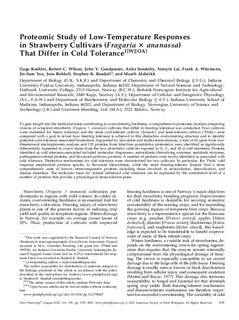Proteomic study of low-temperature responses in strawberry cultivars (Fragaria × ananassa) that differ in cold tolerance
Koehler, Gage; Wilson, Robert; Goodpaster, John V.; Sønsteby, Anita; Lai, Xianyin; Witzmann, Frank A.; You, Jin-Sam; Rohloff, Jens; Randall, Stephen K.; Alsheikh, Muath
Journal article
Permanent lenke
http://hdl.handle.net/11250/134556Utgivelsesdato
2012Metadata
Vis full innførselSamlinger
Originalversjon
Koehler, Gage, Wilson, Robert, Goodpaster, John V., Sønsteby, Anita, Lai, Xianyin, Witzmann, Frank A., . . . Alsheikh, Muath. (2012). Proteomic study of low temperature responses in strawberry cultivars (Fragaria x ananassa Duchesne) that differ in cold tolerance. Plant Physiology. doi: 10.1104/pp.112.198267 10.1104/pp.112.198267Sammendrag
To gain insight into the molecular basis contributing to overwintering hardiness, a comprehensive proteomic analysis comparing crowns of octoploid strawberry (Fragaria × ananassa) cultivars that differ in freezing tolerance was conducted. Four cultivars were examined for freeze tolerance and the most cold-tolerant cultivar (‘Jonsok’) and least-tolerant cultivar (‘Frida’) were compared with a goal to reveal how freezing tolerance is achieved in this distinctive overwintering structure and to identify potential cold-tolerance-associated biomarkers. Supported by univariate and multivariate analysis, a total of 63 spots from two-dimensional electrophoresis analysis and 135 proteins from label-free quantitative proteomics were identified as significantly differentially expressed in crown tissue from the two strawberry cultivars exposed to 0-, 2-, and 42-d cold treatment. Proteins identified as cold-tolerance-associated included molecular chaperones, antioxidants/detoxifying enzymes, metabolic enzymes, pathogenesis-related proteins, and flavonoid pathway proteins. A number of proteins were newly identified as associated with cold tolerance. Distinctive mechanisms for cold tolerance were characterized for two cultivars. In particular, the ‘Frida’ cold response emphasized proteins specific to flavonoid biosynthesis, while the more freezing-tolerant ‘Jonsok’ had a more comprehensive suite of known stress-responsive proteins including those involved in antioxidation, detoxification, and disease resistance. The molecular basis for ‘Jonsok’-enhanced cold tolerance can be explained by the constitutive level of a number of proteins that provide a physiological stress-tolerant poise.
Beskrivelse
The article can also be located on the Plant Physiology web page: http://www.plantphysiol.org/content/159/4/1787
